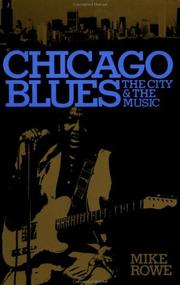| Listing 1 - 9 of 9 |
Sort by
|
Book
ISBN: 1003182593 1000834719 1003182593 103202254X Year: 2023 Publisher: Milton Taylor & Francis Group
Abstract | Keywords | Export | Availability | Bookmark
 Loading...
Loading...Choose an application
- Reference Manager
- EndNote
- RefWorks (Direct export to RefWorks)

ISBN: 0306801450 Year: 1981 Publisher: New York, N.Y. : Da Capo Press,
Abstract | Keywords | Export | Availability | Bookmark
 Loading...
Loading...Choose an application
- Reference Manager
- EndNote
- RefWorks (Direct export to RefWorks)
African Americans --- Blues (Music) --- Noirs américains --- Blues --- Music --- History and criticism --- History and criticism. --- Musique --- Histoire et critique
Book
ISBN: 9783031351273 Year: 2024 Publisher: London Palgrave Macmillan Cham
Abstract | Keywords | Export | Availability | Bookmark
 Loading...
Loading...Choose an application
- Reference Manager
- EndNote
- RefWorks (Direct export to RefWorks)
This book examines the timely issue of police stops as a public and political issue, focussing on the European states. Contrary to much other work it focuses on wider Europe and the social and political context in which the police practice of stopping citizens emerges, develops and can be curtailed. More specifically, the volume analyses public controversies about police stops, i.e. events in which conflicts emerge about how the performance of police stops is explained and justified. This book stems from an EU COST Action research network on Police Stops which engages academics and practitioners from 29 countries. It appeals to those in law, criminology and policing studies with some potential for wider interest in cultural studies/history and public policy/politics, as well as to practitioners in police scrutiny, oversight and other professional bodies and in training organisations.
Book
ISBN: 3031351258 Year: 2024 Publisher: Cham : Springer International Publishing : Imprint: Palgrave Macmillan,
Abstract | Keywords | Export | Availability | Bookmark
 Loading...
Loading...Choose an application
- Reference Manager
- EndNote
- RefWorks (Direct export to RefWorks)
Jacques de Maillard is Professor of Political Science at the University of Versailles-Saint-Quentin, France, and of the Cesdip (Centre for sociological research on penal institutions), an interdisciplinary research center specialised on criminal justice issues. Kristof Verfaillie is Lecturer in Criminology at the Vrije Universiteit Brussel, Belgium. His current research focuses on the relationships between democracy, politics and crime control, focusing specifically on the effects of counterterrorism policies. Mike Rowe is a Lecturer in Public sector Management at the University of Liverpool, UK, and Vice Chair of the EU COST Action on Police Stops. His recent research has been a long-term ethnographic study of police discretion and has recently published Police Street Powers and Criminal Justice with Geoff Pearson. This book examines the timely issue of police stops as a public and political issue, focussing on the European states. Contrary to much other work it focuses on wider Europe and the social and political context in which the police practice of stopping citizens emerges, develops and can be curtailed. More specifically, the volume analyses public controversies about police stops, i.e. events in which conflicts emerge about how the performance of police stops is explained and justified. This book stems from an EU COST Action research network on Police Stops, which engages academics and practitioners from 29 countries. It appeals to those in law, criminology and policing studies with some potential for wider interest in cultural studies/history and public policy/politics, as well as to practitioners in police scrutiny, oversight and other professional bodies and in training organisations.
Criminology. --- Critical criminology. --- Political sociology. --- Human rights. --- Political planning. --- Crime Control and Security. --- Critical Criminology. --- Political Sociology. --- Politics and Human Rights. --- Public Policy.
Multi
ISBN: 9783031351259 9783031351242 9783031351266 9783031351273 3031351258 Year: 2024 Publisher: Cham : Springer International Publishing : Imprint: Palgrave Macmillan,
Abstract | Keywords | Export | Availability | Bookmark
 Loading...
Loading...Choose an application
- Reference Manager
- EndNote
- RefWorks (Direct export to RefWorks)
Jacques de Maillard is Professor of Political Science at the University of Versailles-Saint-Quentin, France, and of the Cesdip (Centre for sociological research on penal institutions), an interdisciplinary research center specialised on criminal justice issues. Kristof Verfaillie is Lecturer in Criminology at the Vrije Universiteit Brussel, Belgium. His current research focuses on the relationships between democracy, politics and crime control, focusing specifically on the effects of counterterrorism policies. Mike Rowe is a Lecturer in Public sector Management at the University of Liverpool, UK, and Vice Chair of the EU COST Action on Police Stops. His recent research has been a long-term ethnographic study of police discretion and has recently published Police Street Powers and Criminal Justice with Geoff Pearson. This book examines the timely issue of police stops as a public and political issue, focussing on the European states. Contrary to much other work it focuses on wider Europe and the social and political context in which the police practice of stopping citizens emerges, develops and can be curtailed. More specifically, the volume analyses public controversies about police stops, i.e. events in which conflicts emerge about how the performance of police stops is explained and justified. This book stems from an EU COST Action research network on Police Stops, which engages academics and practitioners from 29 countries. It appeals to those in law, criminology and policing studies with some potential for wider interest in cultural studies/history and public policy/politics, as well as to practitioners in police scrutiny, oversight and other professional bodies and in training organisations.
Social problems --- Political sociology --- Sociology of law --- Sociology --- Politics --- Economic policy and planning (general) --- Human rights --- Criminology. Victimology --- Criminal law. Criminal procedure --- mensenrechten --- sociologie --- strafrecht --- politiek --- criminologie --- criminaliteit --- Criminology. --- Critical criminology. --- Political sociology. --- Human rights. --- Political planning. --- Crime Control and Security. --- Critical Criminology. --- Political Sociology. --- Politics and Human Rights. --- Public Policy.
Book
ISBN: 0252097505 9780252097508 9780252039416 9780252080999 0252039416 0252080998 9780252039416 Year: 2015 Publisher: Urbana, Chicago, and Springfield
Abstract | Keywords | Export | Availability | Bookmark
 Loading...
Loading...Choose an application
- Reference Manager
- EndNote
- RefWorks (Direct export to RefWorks)
Blues musicians --- Blues (Music) --- Musicians --- History and criticism.

ISBN: 0714125636 Year: 2002 Publisher: London The British Museum Press
Abstract | Keywords | Export | Availability | Bookmark
 Loading...
Loading...Choose an application
- Reference Manager
- EndNote
- RefWorks (Direct export to RefWorks)
Book
ISBN: 3031413636 Year: 2024 Publisher: Cham : Springer International Publishing : Imprint: Palgrave Macmillan,
Abstract | Keywords | Export | Availability | Bookmark
 Loading...
Loading...Choose an application
- Reference Manager
- EndNote
- RefWorks (Direct export to RefWorks)
"Governing Police Stops Across Europe should be essential reading for all those involved in police governance, scrutiny, and practice.” --Gill Imery, former Her Majesty's Chief Inspector of Constabulary Scotland This book takes a critical and comparative approach to the analysis of the governance of police stops across Europe. It draws on an EU COST Action research network on Police Stops which engaged academics and practitioners from 29 countries to better understand the practice of police stops. It begins by examining how police stops are defined and the various legal rules and levels of accountability afforded. The chapters are arranged by theme to focus on a core aspect of the governance of police stops. These include: legal frameworks and police discretion; internal governance; external accountability and civilian oversight; possibilities for legal recourse; and the different roles of data and technology. Eachcompares the distinct approaches evident across Europe, often employing case studies. The book adopts a critical approach, acknowledging governance as contested and involving diverse (state, non-state and supranational) actors. It considers implications for policing in a rapidly changing environment globally. Elizabeth Aston is Professor of Criminology at Edinburgh Napier University, UK, and the Director of the Scottish Institute for Policing Research. Sofie De Kimpe is full time Professor of Criminology at the Department of Criminology at the Vrije Universiteit Brussel (VUB), Belgium and was Chair of the EU COST Action on Police Stops. János Fazekas is Associate Professor at ELTE University, Budapest, Hungary. He was co-leader of the Governance Working Group of the EU COST Action on Police Stops. Genevieve Lennon is Senior Lecturer in Law at the University of Strathclyde, UK. She was co-leader of the Governance Working Group of the EU COST Action Police Stops. Mike Rowe is Lecturer in Public Sector Management at the University of Liverpool, UK, and was Vice Chair of the EU COST Action on Police Stops.
Criminology. --- Public administration. --- Human rights. --- Critical criminology. --- Crime --- Political sociology. --- Crime Control and Security. --- Public Administration. --- Politics and Human Rights. --- Critical Criminology. --- Crime and Society. --- Political Sociology. --- Sociological aspects.
Multi
ISBN: 9783031413636 9783031413629 9783031413643 9783031413650 3031413636 Year: 2024 Publisher: Cham : Springer International Publishing : Imprint: Palgrave Macmillan,
Abstract | Keywords | Export | Availability | Bookmark
 Loading...
Loading...Choose an application
- Reference Manager
- EndNote
- RefWorks (Direct export to RefWorks)
"Governing Police Stops Across Europe should be essential reading for all those involved in police governance, scrutiny, and practice." --Gill Imery, former Her Majesty's Chief Inspector of Constabulary Scotland This book takes a critical and comparative approach to the analysis of the governance of police stops across Europe. It draws on an EU COST Action research network on Police Stops which engaged academics and practitioners from 29 countries to better understand the practice of police stops. It begins by examining how police stops are defined and the various legal rules and levels of accountability afforded. The chapters are arranged by theme to focus on a core aspect of the governance of police stops. These include: legal frameworks and police discretion; internal governance; external accountability and civilian oversight; possibilities for legal recourse; and the different roles of data and technology. Eachcompares the distinct approaches evident across Europe, often employing case studies. The book adopts a critical approach, acknowledging governance as contested and involving diverse (state, non-state and supranational) actors. It considers implications for policing in a rapidly changing environment globally. Elizabeth Aston is Professor of Criminology at Edinburgh Napier University, UK, and the Director of the Scottish Institute for Policing Research. Sofie De Kimpe is full time Professor of Criminology at the Department of Criminology at the Vrije Universiteit Brussel (VUB), Belgium and was Chair of the EU COST Action on Police Stops. János Fazekas is Associate Professor at ELTE University, Budapest, Hungary. He was co-leader of the Governance Working Group of the EU COST Action on Police Stops. Genevieve Lennon is Senior Lecturer in Law at the University of Strathclyde, UK. She was co-leader of the Governance Working Group of the EU COST Action Police Stops. Mike Rowe is Lecturer in Public Sector Management at the University of Liverpool, UK, and was Vice Chair of the EU COST Action on Police Stops.
Social problems --- Political sociology --- Sociology of law --- Sociology --- Politics --- Human rights --- Criminology. Victimology --- Criminal law. Criminal procedure --- Public administration --- mensenrechten --- sociologie --- strafrecht --- maatschappij --- politiek --- criminologie --- criminaliteit --- administratie --- Criminology. --- Public administration. --- Human rights. --- Critical criminology. --- Crime --- Political sociology. --- Law enforcement --- Criminal justice, Administration of --- Stop and frisk (Law enforcement) --- Crime Control and Security. --- Public Administration. --- Politics and Human Rights. --- Critical Criminology. --- Crime and Society. --- Political Sociology. --- Sociological aspects.
| Listing 1 - 9 of 9 |
Sort by
|

 Search
Search Feedback
Feedback About UniCat
About UniCat  Help
Help News
News